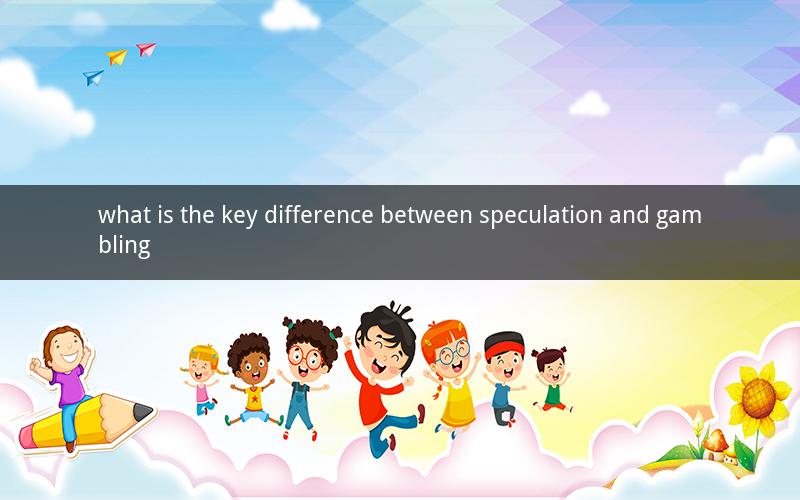
Table of Contents
1. Definition of Speculation
2. Definition of Gambling
3. Key Differences in Objectives
4. Key Differences in Risk Assessment
5. Key Differences in Legal Aspects
6. Key Differences in Social Impact
7. Key Differences in Psychological Impact
8. Key Differences in Financial Impact
9. Key Differences in Timeframe
10. Key Differences in Skill Requirement
1. Definition of Speculation
Speculation refers to the act of engaging in a transaction with the intention of making a profit based on the expected future price movement of an asset. It involves analyzing market trends, economic indicators, and other relevant factors to make informed decisions.
2. Definition of Gambling
Gambling, on the other hand, is the act of betting or wagering on an uncertain event with the primary objective of winning money or material goods. It is characterized by chance and luck, rather than skill or analysis.
3. Key Differences in Objectives
The main objective of speculation is to make a profit by buying and selling assets at favorable prices. Speculators aim to capitalize on market fluctuations and price differences. In contrast, gamblers are primarily interested in winning money, regardless of the asset or event they are betting on.
4. Key Differences in Risk Assessment
Speculators typically conduct thorough risk assessments before engaging in a transaction. They analyze various factors, such as market trends, economic indicators, and asset fundamentals, to determine the potential risks and rewards. Gamblers, on the other hand, often rely on luck and chance, without considering the risks involved.
5. Key Differences in Legal Aspects
Speculation is generally considered a legitimate financial activity, as long as it is conducted within the legal framework. It is regulated by various financial authorities and requires compliance with specific rules and regulations. Gambling, on the other hand, is often illegal or heavily regulated, depending on the jurisdiction. It is associated with various risks, such as addiction and financial loss.
6. Key Differences in Social Impact
Speculation can have both positive and negative social impacts. It can stimulate economic growth, create job opportunities, and contribute to the development of financial markets. However, excessive speculation can lead to market instability and financial crises. Gambling, on the other hand, is often associated with negative social impacts, such as addiction, crime, and social problems.
7. Key Differences in Psychological Impact
Speculation can be mentally challenging, as it requires discipline, patience, and emotional control. Speculators must be able to handle market volatility and stay focused on their investment strategy. Gambling, on the other hand, can be highly addictive and have a detrimental psychological impact on individuals, leading to stress, anxiety, and depression.
8. Key Differences in Financial Impact
Speculation can generate significant financial returns, especially if the speculator's predictions are accurate. However, it also involves high risk, and losses can be substantial. Gambling, on the other hand, is generally associated with high risk and unpredictable outcomes. Most gamblers lose money over time, as the house always has an edge.
9. Key Differences in Timeframe
Speculators often focus on long-term investments, as they aim to capitalize on market trends and price movements over an extended period. They may hold positions for weeks, months, or even years. Gamblers, on the other hand, typically focus on short-term events, such as sports games or casino games, and may place bets within minutes or hours.
10. Key Differences in Skill Requirement
Speculation requires a certain level of skill and knowledge, as speculators must be able to analyze market data, understand economic indicators, and make informed decisions. While some gambling activities, such as poker, require skill, most forms of gambling are based on chance and luck, with little room for skill or strategy.
Frequently Asked Questions:
1. What is the main difference between speculation and gambling?
The main difference lies in the objectives and the level of skill involved. Speculation is about making a profit based on market analysis and requires a certain level of skill, while gambling is primarily about winning money based on chance and luck.
2. Is speculation always legal?
Speculation is generally legal, as long as it is conducted within the legal framework and regulated by financial authorities. However, some forms of speculation may be illegal or heavily regulated, depending on the jurisdiction.
3. Can speculation be addictive?
Yes, speculation can be addictive, especially for individuals who are highly competitive or have a strong desire to win. It is important to practice self-discipline and set limits to avoid excessive risk-taking.
4. Is gambling always illegal?
Gambling is often illegal or heavily regulated, depending on the jurisdiction. While some forms of gambling are legal and regulated, others may be prohibited or considered illegal.
5. Can gambling be a source of income?
Gambling can generate income for some individuals, but it is generally considered a risky and unreliable source of income. Most gamblers lose money over time.
6. Are there any similarities between speculation and gambling?
Both speculation and gambling involve risk and uncertainty. They also require some level of skill or knowledge, although gambling is more heavily reliant on chance.
7. How can one differentiate between speculation and gambling?
The primary difference lies in the intention behind the activity. Speculation is driven by the desire to make a profit based on market analysis, while gambling is driven by the desire to win money based on chance and luck.
8. Can speculation lead to financial ruin?
Yes, speculation can lead to financial ruin if the speculator is not careful. Excessive risk-taking and lack of knowledge can result in significant losses.
9. Is speculation a good investment strategy?
Speculation can be a good investment strategy for individuals who are willing to take on risk and have the necessary skills to analyze markets. However, it is important to have a well-defined investment strategy and risk management plan.
10. Can one become a successful speculator without gambling?
Yes, one can become a successful speculator without engaging in gambling. Success in speculation relies on skill, knowledge, and discipline, rather than luck or chance.